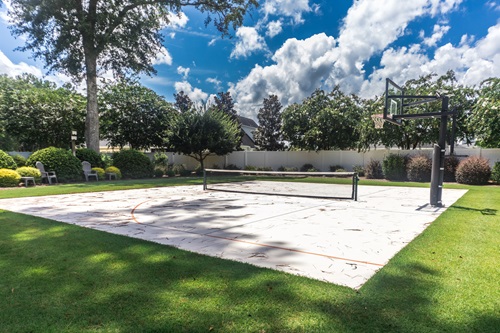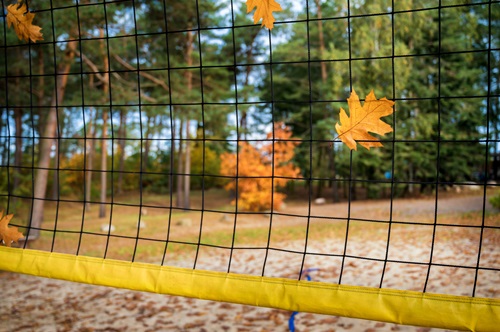
Photo © Wirestock | Dreamstime.com
It could a homeowner’s dream: Their own backyard sports venue where they can practice their pastime in peace, host friends for play dates – or help their own kids sharpen their skills with the goal of moving up through the sports world.
Unfortunately, when those same homeowners come into conflict with neighbors who complain about noise, lighting and worse (illegal gambling rings, running tournaments, coaching for money and running other businesses out of the backyard, for example), it’s time to look at the bigger picture.
In Spring, Texas, for example, a woman started a backyard business at her residential pool to teach swimming lessons.
Make no mistake; it’s a noble cause, considering the nationwide dearth of swimming instructors and the fact that drowning is the leading cause of childhood death for ages one through four in the U.S. (Additionally, adults 65 years of age and older had the second highest rate of drowning and drowning increased by 19 percent in adults ages 65–74 in 2022 compared to 2019 – the year before the pandemic hit, halting lifesaving classes and starting the nationwide lifeguard shortage.)
Neighbors, however, objected and the woman received a cease-and-desist from her local HOA in response to noise complaints. The HOA told her that in order to keep the business open, she would need to get a glass enclosure to drown out the noise. That installation, the reporter noted, would cost in the six-figure range.

Noise is a common complaint about backyard sports facilities, and recently, many of those complaints centered on pickleball courts. In Cape Cod, for example, a couple told a local newspaper they were unable to sell their home because of the noise from nearby pickleball courts. It’s far from the only news stories about such problems; there are simply too many to mention. In fact, USA Pickleball has started a new initiative to help develop and promote quieter products (paddles and balls, for example) as well as noise-mitigating barriers that can go around courts.
Of course, for every one of those stories, there is another, where an outdoor sports court (for pickleball, tennis – or in this case, beach volleyball) constituted an incredible amenity that drove up the desirability of the home.
In some cases, it’s not just noise but the lighting for sports facilities that irritates neighbors. In New England, Flavio Granda Orbes built volleyball and soccer courts in his backyard at his home in Dracut. "I just want to be nice with everybody. I want to say to them I do nothing wrong. I just want to have fun with my friends, with the little kids. They always come to play with us," Orbes said.
But at least one neighbor has complained about the lighting that was shining into his property and onto their walls and ceilings. (It is a phenomenon known as “light spill” or “light trespass,” and it is one of the chief causes of complaints among those who live near sports facilities. While sports-specific LED lighting has done much to eliminate spill and trespass (as well as glare and the cutback in what is called sky glow, or the illumination above the facility), many homeowners simply do not want to have to contend with the issue.
Occasionally, the issue that arise from backyard sports facilities are completely unexpected. Last year, for example, police in Milford, Massachusetts (Massachusetts, what is it with you?) broke up a major illegal gambling ring centered around backyard volleyball tournaments. Teams were traveling from as far away as South Carolina to participate. As much as $30,000 a night was being turned over, and elaborate catering and illegal alcohol sales were taking place.
"I was blown away," said Milford Deputy Police Chief Robbie Tusino. "I even said to the owner after the fact, I got to tell you, I thought I was walking into Foxwoods."
The homeowner paved his backyard, put up volleyball courts and began his operation – which was eventually outed by neighbors who complained to the police about noise, parking congestion and other problems.
Another problem came about in Maryland, when a homeowner put up a 1.5-mile go-kart track for his son – but neglected to file permits and in the process of construction, destroyed nontidal wetlands. The debate, which just came to light, remains ongoing, with neighbors posting to social media, many complaining about noise and habitat destruction, and some offering support to the aspiring racer.

Some neighbors, in seeking to add value to a property that already includes a sports facility, will add additional amenities – and those do not sit well with neighbors. Last summer, headlines were made in Phoenix, Arizona, when a neighbor decided to build a two-story pool house and garage, a structure is taller than any home on the block.
“I understand adding value to your property, but not at the expense of diminishing the value of the property of your neighbor,” said a neighbor who lived adjacent to the home. “It completely encompasses our backyard and changes the whole overall environment. We don’t have privacy anymore.”
In 2018, The Wall Street Journal noted an uptick of parents building backyard sports facilities in order to give their children better ability to train, with the ultimate goal of obtaining a college scholarship. – which is less likely than they might think.
Other sources have noted that putting greens, golf driving ranges (with netting), batting cages and pitching machines, tennis and pickleball courts with ball machines and other high-end amenities are becoming more popular as parents work to move children into one-sport specialization – against the recommendation of doctors and national governing bodies for youth sports. One woman even started a swimming program for students with special needs in her backyard pool.

